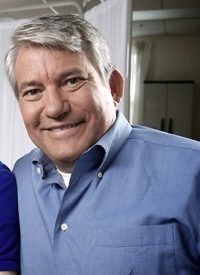
In the taxonomy of politics circa 2010, the Tea Party is typically classified as the party of the Constitution. Newspapers nationwide have chronicled the conservative diaspora from the GOP to the Tea Party. Proponents of small government and those anxious for a return to constitutional principles rejoice at the rise of an alternative to the big government, spend-happy, interventionist, two-headed hound that for decades has skulked along the Potomac River, guarding the entrance to the halls of government.
While it is true that in most instances, the Tea Party candidate is reliably more faithful to constitutional principles than candidates offered by the two major parties, in one Florida race, the candidate espousing time-honored conservative principles is not a member of the Tea Party, but a Republican.
Dennis Ross believes that the United States should immediately dissociate itself from the United Nations. Ross is the Republican Party candidate for Congress from the 12th Congressional District of Florida. Ross’s opponent from the Tea Party, Randy Wilkinson, believes that while the international organization certainly needs tweaking, the United States is better off retaining membership in the 65-year-old body.
Ross’s campaign website confirms the earnestness of his position:
Never should an American soldier be placed under the command of any officer other than an American officer. Nor should any American soldier be placed under U.N. command at any time, for any reason. American soldiers swear to ‘support and defend the Constitution of the United States’ not the U.N. charter.
Mr. Ross’s firm stance on the issue is seemingly outside the mainstream of elective discourse in the current campaign. Both his opponents, including as stated above, the Tea Party representative, prefer maintaining America’s ties to the global governing in waiting.
Ross’s Democratic rival, Lori Edwards, told the Lakeland Ledger that it would be "unwise to quit the U.N. while fighting terrorism around the world." The aforementioned Tea Party candidate, Randy Wilkinson, agreed with Edwards as to the wisdom in perpetuating America’s relationship with the U.N. Wilkinson cited the "good the organization does."
According to Ms. Edwards’s reckoning, the harm done to America’s international reputation would only be exacerbated by leaving the United Nations. The hammer of her reasoning strikes a familiar chord: "We’re fighting a global war against terrorism. Having allies worldwide is important. Getting out of the U.N. would undermine relationships and make us less secure. The U.N. makes us more able to fight terrorism," she explained to reporters from The Ledger.
Mr. Wilkinson views the matter through a more materialistic lens. "My position is that we should only pay for our fair share. We’re seen as an easy mark," he told reporters. He insisted that other countries "should pay their own costs, all of their costs, including their own security. It should be pay to play," he said.
Regarding the funding of the global behemoth and all its accompanying initiatives, a report published by the Heritage Foundation presents data indicating that American funding of the United Nations has topped all previous historical levels. The document reports that the budget for 2011 includes $516.3 million for the operating budget of the U.N. and an additional earmark of $2.2 billion for the continued funding of peacekeeping missions around the world.
Remarkably, Ross has received the endorsement of several influential Floridian politicians from both parties. According to information provided on the Ross for Congress website, supporters with high statewide name recognition have thrown their weight behind Ross’s campaign. Among the most recognizable names are Jeb Bush, former governor and Tom Gaitens, the State Director of FreedomWorks.
Ross has attracted a few noteworthy figures of national prominence as well: Newt Gingrich, Dick Armey (Chairman of the aforementioned FreedomWorks organization), and Mike Huckabee.
Several elected leaders have endorsed Ross’s race, too. The roster includes many familiar names, but only one has contributed a blurb to be used below his name on the endorsement list. Incumbent Congressman Adam Putnam (who is retiring from the seat in order to seek election as Florida’s commissioner of agriculture) is quoted as saying, "I know Dennis to be strong advocate for smaller government, lower taxes, and strong defense. Dennis’ [sic] record of walking the walk for our conservative principles in the legislature speaks for itself. I am proud to join all of my colleagues in endorsing Dennis Ross and ask the voters who have supported me in the past, to support Dennis."
Although he backs Ross’s campaign heartily and without reservation, a spokesman for Congressman Putnam issued a statement wherein he made clear that while Putnam supports "reforming the institution [the U.N.]," he does not join in Ross’s call to leave the organization altogether.
Notwithstanding the apparent novelty of the position, Dennis Ross’s anti-United Nation’s stance has an impressive conservative pedigree. Before the U.N.’s first girder was erected in midtown Manhattan, America’s participation in the group faced substantial resistance. And later, Senator Barry Goldwater was quoted in 1971 by the Congressional Record as saying:
The time has come to recognize the U.N. for the anti-American, anti-freedom organization that it has become. The time has come for us to cut off all financial help, withdraw as a member, and ask the U.N. to find a headquarters location outside the United States that is more in keeping with the philosophy of the majority of voting members, someplace like Moscow or Peking.
The John Birch Society’s campaign to "Get US Out! of the U.N." was launched nearly a decade before Senator Goldwater’s statement. In 1962, the John Birch Society (founded in 1958) initiated an educational program to inform Americans as to the true aims of the United Nations, all of which were contrary to the lasting freedom and sovereignty of the United States. Bumper stickers and billboards proclaimed the Birch Society’s goal to "Get US Out! of the United Nations."
There are those currently serving in the government of the United States who seek the end of American’s relationship with the United Nations. Tennessee’s John Duncan and Texas’s Ron Paul (both members of the congressional Liberty Caucus) have worked for years to restore America’s sovereignty through withdrawal from the United Nations.
As for the nation at large, there are a surprising number of Americans who support the perpetuation of American funding of and involvement in the United Nations. In a survey of nearly 3,000 Americans conducted by the Chicago Council on Global Affairs (formed in 1922 as the Chicago Council on Foreign Relations to oppose what they termed American "isolationism"), 54 percent of respondents favored a strengthening of the United Nations and an astonishing 64 percent supported the creation of a standing U.N. peacekeeping army.
Regardless of the strength of the headwind of public opinion, Mr. Ross is committed to staying the course of defending American sovereignty through the eradication of our entanglement with the United Nations and its ever-expanding theater of military operations. In a statement to The New American, Mr. Ross said:
An organization that allows nations like Iran and Libya to chair committees dedicated to human and women’s rights makes a mockery of both. The UN, like any bureaucracy, must constantly be evaluated and put to the test, and if found lacking, be dismantled. I believe the US government is perfectly capable of conducting bilateral and multilateral relations with other nations on our own. Despots, human rights violators, and tyrants should be confronted, not congratulated.
There is hope for Dennis Ross’s campaign specifically and the movement to disengage ourselves from the United Nations, generally. The latest public opinion poll conducted among likely voters in Florida’s 12th Congressional District shows Ross running nearly neck and neck with the Democratic candidate, with the Tea Party’s choice running a distant third. (John McCain received 51 percent of the vote in this district in 2008.)



